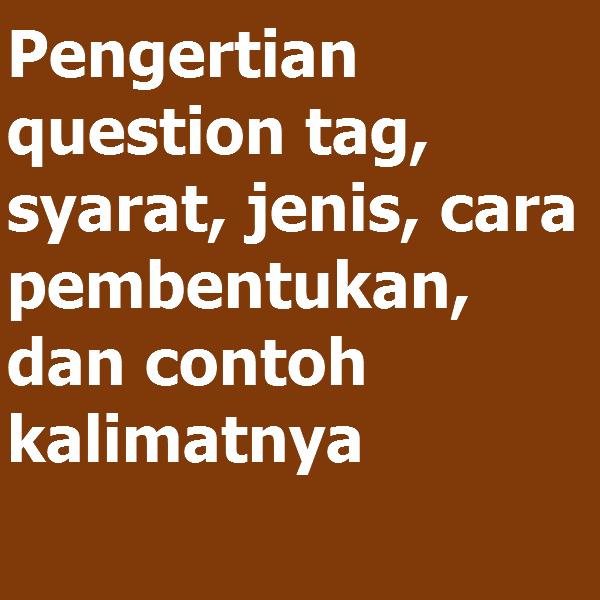Bagikan: |

Apa pengertian question tag dan bagaimana syarat, jenis, cara pembentukan, serta contoh kalimatnya?
Question tag adalah bentuk pertanyaan berekor atau pertanyaan yang hadir mengikuti suatu pola pernyataan. Question tag berfungsi untuk mempertegas suatu pernyataan yang hadir mendahuluinya; bentuk question tag apabila diterjemahkan ke dalam bahasa Indonesia diungkapan dengan kata kan?/bukan.
Syarat utama dalam question tag adalah:
- Bilamana kalimat pernyataan (kalimat mula-mula) dinyatakan dalam bentuk positif, maka tag (ekor)-nya harus dalam bentuk negatif.
- Bilamana kalimat pernyataan (kalimat mula-mula) dinyatakan dalam bentuk negatif maka tag (ekor)-nya harus dalam bentuk positif
Untuk memudahkan cara pembuatan question tag, kalimat pernyataan di sini dibagi dua:
- Mengandung auxiliary
- Tidak mengandung auxiliary
1. Kalimat mengandung auxiliary
S + auxiliary + V/be + O/Complement, auxiliary not + S ?
S + auxiliary not + V/be + O/Complement, auxiliary + S ?
Contoh:
- She is going to come here, isn ’t she?
- He cannot go now, can he?
- You will be here with me, won ’t you?
2. Kalimat tidak mengandung auxiliary
S + V1 + O, do/does not + S ?
S + V2 + O, did not + S ?
S + do/does/did not + V + O, do/does/did + S ?
Contoh:
- She loves me, doesn ’t she?
- He went to school, didn 't he?
- We didn t see them, did we?
Hal yang perlu diperhatikan
1. Subject dalam kalimat pernyataan diulang dalam tag-nya dalam bentuk personal pronoun (kata ganti).
- Anto will be here. Won’t he?
- The students are lazy to do the homework, aren’t they?
2. Pernyataan yang bersubject everybody; everyone, everything, anybody, anyone, nobody, no one diulang dalam tag-nya menjadi ‘they’.
- Everybody watched the movie, didn’t they?
- No one cares of me, do they?
3. Apabila pernyataan dalam bentuk perintah, tag-nya menjadi ‘will you?’; will you? di sini biasanya diterjemahkan dengan mau kan? atau tolonglah.
- Come here, will you?
- Be quite, will you?
- Don’t be lazy, will you?
- Please don’t go, will you?
4. Pernyataan yang berawalah let us/let’s diulang dalam tag-nya menjadi ‘shall we?’; shall we? di sini biasanya diterjemahkan dengan mau kan? atau ayolah.
- Let’s see the movie, shall we?
- Let us pay attention to the teacher’s speaking, shall we?
5. Pernyataan positif untuk T am’ harus ber-tag-kan aren ’t I?
- I am pretty, aren’t I?
- I am going to get the first prize in the beauty contest, aren’t I?
- I am not guilty, am I?
- I’m not what you thought, am I?
6. Pernyataan yang mengandung kata: never, seldom, rarely, barely, hardly, few, little, dianggap berpengertian negatif, oleh karenanya tag-nya harus dalam bentuk positif.
- You seldom have your hair cut, do you?
- She never seems to care, does she?
- She can hardly see us without her glasses, can she?
